The Andhra Pradesh High Court at Amaravati on Wednesday (10 September 2025) put an end to a long-running family dispute over ancestral property, dismissing the second appeal filed by two purchasers who had challenged the rights of daughters in the property. Justice V. Gopala Krishna Rao confirmed the earlier rulings of the trial court and first appellate court, both of which had recognised the daughters' equal entitlement alongside their brothers.
Background
The roots of the case go back nearly seven decades. The property in question was originally bought in 1957 by one Samayamanthula Sarvayya, a resident of Madisettivaripalem village, Chintalapudi Mandal, West Godavari. After his death in 1982, he left behind children from both his marriages-sons and daughters alike.
In 2004, three of the sons sold large portions of this property to outside buyers (defendants 4 and 5 in the suit). The daughters later discovered the transactions and moved court in 2006, seeking partition of the land and their rightful share. They alleged that their signatures had been misused and that the sales were done behind their back.
The trial court at Eluru decreed the suit in favour of the daughters. The first appellate court later confirmed the order, with slight modifications. The outside purchasers, unhappy with the outcome, filed a second appeal before the High Court in 2021.
Court's Observations
Justice Rao carefully examined the legal position. He noted that under the Hindu Succession (Amendment) Act, 2005, daughters are entitled to equal coparcenary rights by birth, just like sons. Citing the Supreme Court's ruling in Vineeta Sharma v. Rakesh Sharma, the judge reminded that oral partitions carry little weight unless supported by strong documentary evidence.
The bench was blunt:
''The sale deeds executed by the sons without involving their sisters cannot bind the daughters’ share. They are Class-I heirs, and their rights are protected under law. ''
The court also rejected the purchasers' claim that the daughters had relinquished their rights. Justice Rao observed that a simple letter or a revenue record entry does not amount to legal relinquishment. The court clarified,
''Any relinquishment of rights requires a registered deed. Without that, the claim of abandonment cannot stand,''
Arguments that the purchasers were bona fide buyers also failed. The court said that buyers should have ensured that all heirs, including daughters, were part of the transaction. Since they ignored this, the sales remain binding only to the extent of the brothers'' share, not the sisters'.
Also Read : Allahabad High Court Grants Bail to 15-Year-Old in Sultanpur POCSO Case After 18 Months in Custody
Decision
Finding no ''substantial question of law'' to interfere with, the High Court dismissed the second appeal. The judgment of the first appellate court thus stands confirmed, ensuring equal division of the property between sons and daughters of the late Sarvayya.
With that, a nearly 20-year legal battle over a piece of land in West Godavari finally comes to rest-on the side of gender equality within family inheritance.
Case Title : Smt. Madeti Ramadevi vs. Smt. Vandanapu Basavamma
Case Number: Second Appeal No. 108 of 2021













